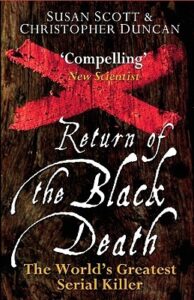 Return of the Black Death: The World’s Greatest Serial Killer,Susan Scott, Christopher J. Duncan
Return of the Black Death: The World’s Greatest Serial Killer,Susan Scott, Christopher J. Duncan
Full disclosure: I was sceptical before I even picked this up from the sensational title. You’ve got to go a seriously long way to convince me that the Plague is the “world’s greatest serial killer”, even if we accept that a disease should be considered in such an anthropomorphic light. Let me introduce you to your friendly neighbourhood Influenzavirus A, my #1 vote for “disease most likely to have the means to suddenly eradicate humanity”.
I picked it up because an author tweeted a thread of things she would never let anyone change her mind about, and one of the items was that she doesn’t believe the Black Death was caused by Yersinia pestis. Now, infectious disease is one of my special interests, and I already happened to know that Yersinia pestis has, for example, been isolated from plague pits. So I asked her for evidence of the claim, and she pointed me to this book.
Well.
From the start, it was not very rigorous or scientifically accurate? They’ve claimed that HIV is completely understood and under control and causes no panic, for one thing. (I wrote my dissertation on tuberculosis, so I can guarantee you that no HIV isn’t fully understood, because if we could, for example, understand how it and tuberculosis enable each other, that would be really helpful. We have theories, but as of a year ago, we don’t really know for sure.)
And then they make absurd statements like this: “…by all the rules of infectious diseases, when the Black Death was finished it should have disappeared.”
What?! Have they never heard of animal reservoirs? Re-introduction from the original sources? Endemic diseases? Fast-adapting diseases like influenza that change their surface proteins and thus evade immunity? Infectious diseases almost never just “disappear”, though there may be an outbreak in a new species due to chance contact that doesn’t reoccur that might look like disappearance.
What rules of infectious diseases can they possibly be referring to?
I mean, how many diseases do you even know of that have been driven extinct after much effort by humans doing so deliberately? That’ll be two: smallpox and rinderpest. (Smallpox is the only human disease to be eradicated, and with the aid of a highly effective vaccine and extremely persistent vaccination campaigns, it took 11 years of intense campaigning. We have so far been unable to repeat the effect on other target pathogens.)
And there’s this one: “[Measles] is not a danger to well-nourished children in the developed world.” Measles, which can kill (yes, even in the developed world), and furthermore wipes out your immune memory as well as depressing your innate immune system. And they think that Ebola literally liquefies your internal organs.
And then, you know, I read the immortal words stating that “it came as a great surprise to learn” that Iceland had effective contact with the rest of Europe in the 15th century, and also suffered two major outbreaks of the Black Death. Do they just… know nothing of history? At all? Clearly not: they also referred to a manuscript from 1404 as “ancient”…
I had more quibbles. Honestly, I was made out of quibbles about this book. I do have some lingering questions from good points they raised about the vectors, since they claim that rats/fleas of the type that could transmit bubonic plague were not present in Britain and certainly not in Iceland. It’s clear that their claim it was simply too cold in Britain for bubonic plague to survive is untrue, since studies since the publication of this book with reliable controls have found Yersinia pestis in plague pit remains in Britain, but that still makes me wonder about the vectors.
I’d also like to see independent verification of their work on the incubation period of the Plague, which according to their calculations aren’t at all like the modern Yersinia pestis (which is not genetically that different from the medieval version). However, the shakiness of their grasp on facts elsewhere leads me to doubt just about everything they say.

Yeah, same on all of this. Also, I enjoyed (“enjoyed”) how they decided that the numbers of dead given in contemporary manuscripts are unreliable because they’re contemporary, but everything else in said manuscripts is completely reliable and should be taken as gospel.
Y-e-e-e-s, that was certainly interesting. And their dead certainty that deaths were recorded accurately on the right dates… y-e-e-e-s.
I kind of want to hate-read this book now, but they alienated me with that appalling font choice. Thanks for letting me know this is the next bit of pseudo-science garbage I’ll be hearing at family gatherings.
Oh god, things that override my Kindle fonts make me see red so this one drove me straight up the wall. Whyyy.